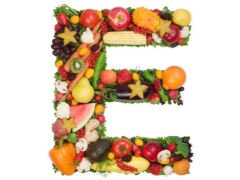Vitamin E for children
Vitamin E is one of the important compounds for children, and its lack threatens with problems with metabolic processes and immunity. It is also manifested by a decrease in activity and impaired growth of the child, so this vitamin should be fed daily to the child's body with food or with vitamin preparations.
At the same time, before buying a multivitamin complex or a vitamin E preparation, each mother should find out whether it is possible to compensate for the lack of such a compound with food and how to properly apply pharmaceutical supplements with vitamin E.
Action of vitamin e
This vitamin, which is also called tocopherol, is a fat-soluble substance that has such an effect on the body:
- Due to its antioxidant effect, vitamin E prevents inflammation and protects cells from damage.
- This vitamin is important for the functioning of the heart and the endocrine system.
- Vitamin E is involved in oxidative processes and blood coagulation.
- A sufficient amount of this vitamin is important to support immunity.
- Tocopherol has a beneficial effect on the vascular walls and protects red blood cells from destruction.
- The presence of vitamin E is important for muscle function, the absorption of vitamin A, and faster tissue regeneration for injuries.
Childhood Needs
Vitamin E should be taken daily by the child, depending on age, in such quantities:
|
Up to a year |
3 mg |
|
In 1-2 years |
6 mg |
|
In 3-10 years |
7 mg |
|
Girls over 11 years old |
8 mg |
|
Boys over 11 years old |
10 mg |
Doctors also distinguish groups of children who have an increased need for vitamin E:
- Newborns who were born prematurely. In these babies, fat absorption is impaired, and the lack of tocopherol increases the risk of infections and retinal damage.
- Kids who have congenital abnormalities in the assimilation of fat or gastrointestinal disease, in which the absorption of nutrients is impaired. In this case, children with cystic fibrosis prescribe synthetic water-soluble vitamin E.
Vitamin E Products
Tocopherol is contained in different products - both of animal origin (of which it is better absorbed), and of plant. Breast babies get this vitamin from mother's milk, and baby-fed pips - from a mixture enriched with vitamins. When it comes time to get acquainted with the lure, the baby begins to receive tocopherol and from the new food that he tries.

In order for an older child not to feel a shortage of vitamin E, his diet should include:
- Vegetable oils (especially unrefined).
- Sunflower seeds and pumpkin seeds.
- Germinated grain.
- Nuts and peanut butter.
- Legumes
- Pike perch, salmon and other fish.
- Beef and beef liver.
- Eggs
- Potatoes.
- Sea buckthorn and blueberry.
- Spinach.
- Apricots and dried apricots.
- Apples
- Sour cream and milk.
Moms should remember that heat treatment leads to partial destruction of this vitamin. For this reason, vegetable oils are best added to ready meals, nuts should not be offered to children fried, and the heat treatment of vegetables should be short.
Vitamin E Supplements
Types and forms of release
All additives whose ingredient is tocopherol can be divided into single component (contain only vitamin E) and multicomponent (include other vitamins, mineral salts and other ingredients). Vitamin E in their composition is natural or artificial. It is believed that tocopherol from natural sources is twice as effective as the synthetic variant.
The drugs are produced in different forms - capsules, chewable lozenges, liquid oil solution, syrup. For infants, supplements in drops are more preferable, since it is more convenient to dose them at an early age, and lozenges and vitamin E in capsules are given to children over six years old, who are able to swallow them.
Frequently ill children are advised to take complexes in which vitamin E is combined with ascorbic acid and vitamin A. To prevent a lack of tocopherol, the child can be given Pikovit, Alfavit, Supradin, Vitrum, Sana-sol, Multi-tabs and others.
Indications
Drugs in which tocopherol is the main component are prescribed only for hypovitaminosis of a given substance, which is confirmed by a blood test. Prescribe such vitamin supplements in childhood should only a doctor.
Vitamin E in the composition of multivitamins is recommended to take when:
- Frequent colds and SARS.
- Lack of weight at an early age.
- Unbalanced nutrition of the child.
- High physical exertion.
- The period of recovery after illness.
- Overworked.
- Accommodation in an area where the adverse environmental and radiation situation.
Contraindications
Vitamin supplements, including tocopherol, do not give in the presence of intolerance to any of their components. Also, preparations with vitamin E should not be given to children with iron deficiency anemia, since tocopherol can worsen their condition. For serious illnesses and problems with blood coagulation, the use of vitamin E should be careful.
Instructions for use
Vitamin supplements in the drops are dosed with a pipette, and lozenges and capsules give the child to chew or swallow during meals. It is important to observe the doses recommended by the doctor and not to forget about the age restrictions indicated in the instructions for the preparation.
Since the best time for taking vitamins is morning, often multivitamin complexes are given during breakfast or after it.
Overdose
If the child consumes vitamin E in a small excess, it will not adversely affect his health, since excess compound will be excreted in the bile. Significantly overdose of tocopherol can lead to headaches, indigestion, weakness, visual impairment, high blood pressure, hormonal disorders. If the child has such symptoms, the vitamin E drug should be immediately canceled, and the baby should be shown to the doctor.
Watch the show "Live healthy!" about vitamin E - learn a lot of interesting things.















